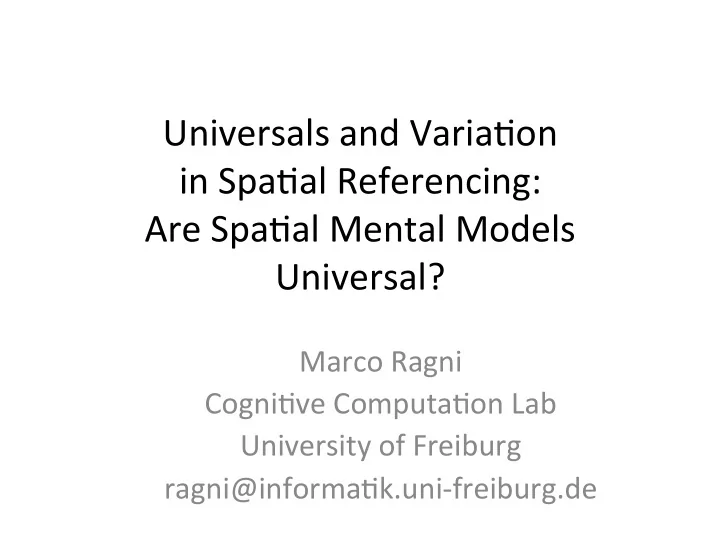

Universals and Varia-on in Spa-al Referencing: Are Spa-al Mental Models Universal? Marco Ragni Cogni-ve Computa-on Lab University of Freiburg ragni@informa-k.uni-freiburg.de
My focus Language Spa-al Mental Models Cogni-ve Background processing (WM) Knowledge
Reasoning about spa-al rela-ons I A* is to the leP of B Premises: B is to the leP of C D is in front of C E is in front of A Ques+on: Which rela-on holds between D and E? A B C Model: E D *Just for representa-onal reasons leRers instead of words are used …
Spa-al reasoning about rela-ons: Ambiguous representa-on A is to the leP of B B is to the leP of C A is to the leP of C D is in front of C E is in front of A Which rela-on holds between D and E? A A B B C C E E D D A C B E D Johnson-Laird & Byrne, 1991; Knauff et al., 1995; Rauh et al., 2005
Reasoning about rela-ons II Discon+nuity and figure effect Con+nuity effect Bob is taller than Debbie. Charly is taller than Adam. Charly is taller than Adam. Adam is taller than Bob. Bob is smaller than Adam. Bob is taller than Debbie. Is Charly taller than Debbie? Is Charly taller than Debbie? Nejasmic, J., Bucher, L. and Knauff, M., 2015. The construc-on of spa-al mental models—A new view on the con-nuity effect. The Quarterly Journal of Experimental Psychology, 68(9), pp.1794-1812.
Universals? Ø Hypothesis: Cogni-ve spa-al processes that are not directly related to language regions in the brain are rather “universal” Ø Due to “working memory” processes of parsimonious representa-ons Ø Due to the localiza-on of these processes Ø Building upon the Hard- and SoPware idea: Brain, Knowledge, Language Ø Hypothesis: We can gain some insight if we look which regions are ac-ve in the brain when spa-al rela-onal informa-on is processed?
Meta-analysis Frontal Lobe Parietal Lobe Prefrontal Cortex Inferior Frontal Gyrus vlPFC Superior Parietal Cortex Inferior Parietal Cortex MC PMC (dorsolateral) (pars oper.) (pars triang.) (pars orb.) medial lateral AG TPJ / SMG Author Year BA 4 6 8 9 10 11 44 45 46 47 5 / 7 5 / 7 39 40 Prado et al. 2012 � � � � � � ( � ) ( � ) � � spatial Goel & Dolan 2001 � (40%) � Goel et al. 1998 � � - - - - Knauff et al. 2002 � � � (60%) � Knauff et al. 2003 � � (70%) Ruff et al. 2003 � � � * Goel et al. 2004 � � � � � � (60%) � Goel & Dolan 2001 � (60%) � Knauff et al. 2003 � � � � � (70%) Fangmeier et al. 2006 � � l (30%) � � Fangmeier & 2009 � � l (50%) � Knauff Wendelken & Bunge 2009 � � � � � � � (30) � (60%) � � Prado et al. 2009 � � (50%) � Prado et al. 2010 � � (40%) � (40%) � � Shokri-Kojori et al. 2012 � � � � � � (50%) � � Acuna et al. 2002 � � � � * � (50%) � � visual Hinton et al. 2010 � � � � (30%) � Prado et al. 2013 � (80%) What is the role of these regions in the non-spatial Goel et al. 1998 � � ( � ) spa-al reasoning process? Knauff et al. 2003 � � � � (70%) Knauff et al. 2003 � (70%) � � � Goel et al. 2009 � � � ( � ) Brzeziczka et al. 2011 � � (50%) � (80%) � � ! Ragni, Franzmeier, Wenczel & Maier (2014)
TMS Methods Spa-al mental models and the rSPL Transcranial Magne-c S-mula-on
Localiza-on of Spa-al Mental Models Ø Effect of s-mula-on site: Vertex > SPL s-mula-on Ø Effect of model type: incorrect > correct models preferred > alterna-ve models Ø SPL S-mula-on of correct models affected the accuracy, while incorrect models remained unaffected Ø Working memory capacity moderates effect of TMS Ragni, Franzmeier, Maier & Knauff (2016). Uncertain rela-onal reasoning in the parietal cortex. Brain and cogni-on, 104:72–81.
Open ques-ons Ø Cogni-ve processing: Meta-analysis shows the involvement of the SPL in the model construc-on and varia-on process TMS-Study supports the role of the SPL for the manipula-on of “spa-al mental models“ Ø Is language and background knowledge more relevant for the construc-on of models? Ø Are PMM stable across cultures? Not for topological informa-on (Knauff & Ragni, 2011)? Ø Neuro-experiments so far only for specific rela-ons and only in English/German/Japanese. What is about other languages? Especially languages that use same words for different situa-ons? (Bloom, 1999)
Recommend
More recommend